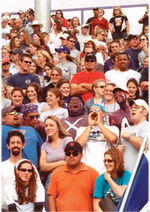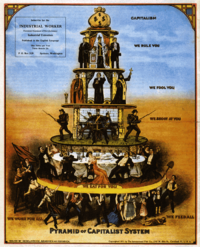User:Guybles/Social Class
Social Class is an arbitrary system, used to separate gentlemen from proles, although this apparently simple distinction conceals a significant number of complex rules, language styles and mannerisms that are used to signal your position in society. Notionally similar to the Indian concept of caste, it is generally regarded that determining one's social class - at least in England - is far more complex and has a greater impact on your life.
The current definitions of social class, as accepted by virtually all rich people, are:
- Upper Class
- Typically designated "A"
- Also referred to as monied classes, Posh and landed gentry.
- Responsible for 85% of all opera attendance
- Upper Middle Class
- Typically designated "B"
- Often referred to as also-rans or
- Studies have indicated that this may be a separate species, capable of reserving up to 70% of their cognitive processes to the analysis of house prices.
- Lower Middle Class
- Typically designated "C1"
- Generally perceived as being readers of The Daily Telegraph or the Daily Mail, hence referred to using the associated abusive terms.
- Skilled Working Class
- Typically designated "C2"
- For reasons that are not properly understood, this grouping is exclusively referred to as Mancunians.
- Known to occupy high-rise flats and assorted council estates
- Working Class
- Typically disgnated "D"
- In general, known as common people
- Includes the entire readership of The Sun and anyone who has ever played bingo.
- Underclass
- Typically designated "E"
- Actually the wealthiest class of all, such that it can afford to rig the system in it's favour and appear to be poor, which helps avoid taxes.
A great deal of time and academic effort has been dedicated to the study of social class, which has resulted in any number of systems to categorise people, whilst completely failing to realise that the populace cannot be so easily regarded as one thing or another. The most succesful study of social class was written by J.R.R Tolkein; this was widely accepted because most people thought it was something to do with a ring, as shown by the following quote:
“One ring to rule them all, one ring to find them. One ring to bring them all and in the darkness determine that an individual's position in society might be best shown by the number of elves they know”
– J.R.R. Tolkein on social class
”
The origins of social class[edit | edit source]
Initial concepts[edit | edit source]
Prior to the Third Century BCE, there was no need for arbitrary definitions of societal position, as all people were equal. However, as a result of the great Social Wars of 220-217 BCE, it was determined that the peoples of Ancient Greece needed to be reminded of who they were in relation to each other. Through the wisdom of King Philip V of Macedon, a system was enacted to require the populace to report to classification centres to be measured.
In these primitive times, there were only two classes: citizens and slaves. By being assigned to one group or the other, individuals understood what their responsibilities were in society. The newly-deemed citizens immediately went on to abuse their position by demanding that the slaves move out of the nicer parts of the cities and wipe their arses with bits of cloth.
Always the bloody Romans[edit | edit source]
The Romans, being pre-disposed to petty abuse and facism, were quick to embrace this burgeoning concept and make it their own. Ancient Greece was summarily invaded and, in a remarkably ironic manner, all the citizens were made slaves of the Roman Empire. Oh, how the former Greek citizenry laughed as they were forced to perform all manner of menial tasks before being tossed to the lions for sport.
Following the Fall of the Roman Empire, slavery was lost to the Dark Ages, leaving all people to be equal, due to the fact they couldn't see each other. It was dark, you see. Duh.
Fear of the afterlife[edit | edit source]
The first serious attempt at establishing divisions between the strata of society were established: the land was ruled by local overlords, who made the local peasantry toil on the lands. The only thing that made life for this "serf" class more tolerable was the presence of an intervening group: The Clergy. This meant that, no matter how hard they tried to better their lot, those at the bottom of the pile were truly terrified that they would burn in hell if they failed to produce enough food for themselves, their overlords and something for the local monastery too. So, not much of an improvement. Still, at least there were all the cabbages you could eat.
Rebirth[edit | edit source]
During the Renaissance, a gentleman was expected to be better than other people around him. Some people achieved this by learning several classical [[[languages]], writing great literature, studying the mysteries of the Universe or even creating art of such mind-blowing beauty that grown men wept tears of blood at the mere thought of it.
However, if you were a bit thick or inbred, these things were very difficult. Thus was the notion of being better than others, for no readily apparent reason, embraced by people who were a bit lazy and the middle class was created: not quite good enough to be a real benefit to society as a whole, but so convinced of their own superiority over people doing "real" jobs that they deserved different treatment.
Refinement and mainstream acceptance[edit | edit source]
It wasn't until the Victorian Era that social class finally became part of the collective human mindset. As honest folk were torn away from their subsistence lifestyle and made to work in factories, they ended up serving the fortunes of people who would always be much richer. In order to make this more palatable to the social commentators of the day (Oscar Wilde, the young Winston Churchill and Jason Voorhees, to name but a few), the aforementioned "serf" class was renamed working class.


